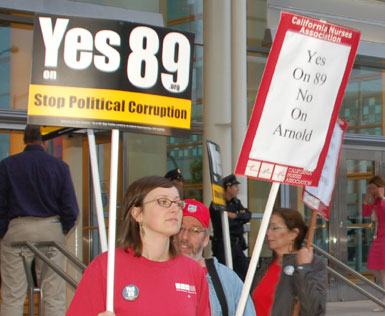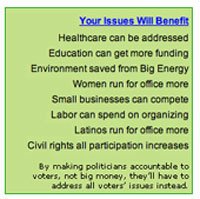
I hate "campaign finance reform." As a worker in elections, often for poorly funded populist candidates, mostly I've experienced the various schemes to control the influence of money in campaigns as more hurdles than a help. Every additional requirement for disclosure, every additional regulation, amounted to further opportunities for armies of election lawyers and accountants, but helped non-incumbent challengers little, if at all.
The Supreme Court created an insuperable barrier to most efforts to dam the flow of money into elections by holding that rich people have as much right to free speech as poor people. That logic, and it is logical from a purist free speech perspective, means that that spending limits and contribution limits always come with "work arounds" open to the well-heeled and imaginative. Many of these take the form of "independent expenditures" -- campaign activities carried out by "committees" and individuals that are not coordinated with candidates. Meanwhile non-profit organizations and unions operate under rules that preclude their taking advantage of the ruses that enable wealthy individuals to make themselves felt in campaigns.
And so, people concerned that money is distorting democracy are always looking for new ways to level the playing field. Their current best plan is to take financial advantage out of elections as much as possible by substituting public financing for all that begging from rich interests that candidates now must do. How does it work?
Reforms along these lines have been enacted in Maine and Arizona. The sky has not fallen; more and more candidates are choosing to participate in the "clean" system; some new voices have come to the fore. (Pretty good discussion here.)Clean Elections gives candidates the option to qualify for public funding to run their campaigns. While the specifics vary, typically a candidate must collect a set number of small qualifying contributions -- usually $5 -- from people in their district. The number of signatures and contributions required varies according to the office sought.
If a candidate runs under the Clean Elections system and faces an opponent who is running with private contributions and outspends the publicly funded candidate, the law typically provides a matching grant, to a limit, to the publicly funded candidate. Extra funding is also often available if there is independent spending against a candidate by an outside group or individual.
Candidates who choose not to participate in the Clean Elections system can raise money from private donors, but must follow state campaign finance limits and disclosure laws. Clean Elections laws must be voluntary to comply with the Supreme Court’s 1976 Buckley v. Valeo ruling, [that's the rich people's free speech rule] which specifically approved of voluntary public financing systems.
"Clean elections" seem to prove that changing the whole system works slightly better at fostering fair competition than reforms that tinker at the edges.
The California Nurses Association (CNA) did the work and paid the money to get the signatures to put Prop. 89, a Clean Elections measure, on the November ballot. (That statement is a complement from me to CNA, not a slam. All initiative measures in California get on the ballot because some interest pays professional signature gatherers. I saw enough actual CNA staff petitioners to know that they probably collected as many unbought signatures as any initiative in recent memory!) The new law would provide public funding for candidates who raise a small sum from many contributions. It would be paid for by a 0.2 percent tax on corporations. The measure would also set $10,000 limits on contributions to ballot measure campaigns from corporations and some other entities. (We have lots of entities and if having more will get money into campaigns, we can be sure they'll proliferate.)
 CNA sells Prop. 89 as a panacea: "everyone wins!" Pass our proposition and you'll be able to get all the good policies you want that government refuses to give you. See adjoining clip from the campaign website. This seems deceptive hyperbole to me; we aren't going to get the policies or the democracy we want through some elections gimmick. There are no shortcuts to organizing majorities of aroused citizens.
CNA sells Prop. 89 as a panacea: "everyone wins!" Pass our proposition and you'll be able to get all the good policies you want that government refuses to give you. See adjoining clip from the campaign website. This seems deceptive hyperbole to me; we aren't going to get the policies or the democracy we want through some elections gimmick. There are no shortcuts to organizing majorities of aroused citizens.Most of the good government groups in the state, such as the League of Women Voters, have lined up behind Prop. 89. The usual suspects, big business (Chamber of Commerce) and big media (newspapers), assure us that Prop. 89 is unfair. The provisions restricting contributions to ballot measure campaigns peeled off the very biggest unions like the California Teachers Association from supporting the measure. They have gotten very good at using their funds to win initiative fights. They don't want no stinking limits! On the other hand, some union locals and the huge United Teachers of Los Angeles think Prop. 89 is a good idea.
All this is likely to be moot. Polls indicate that California voters hate the notion of publicly funded campaigns. Government has become increasing unable to deliver wellbeing to voters; it is hamstrung by a series of rightwing populist initiatives including tax limitations, budget set-asides and restrictive term limits. It doesn't work very well and people are, by and large, unwilling to put new money in the hands of politicians they already distrust.
This all goes back to the gimmick problem I raised above. We aren't going to win a reform such as "Clean Elections" unless we actually organize a broad constituency behind it that understands the proposed remedy and will work and sacrifice to win it. If we organize such a constituency, we can win a lot of other things, whether we win election reform or not.
I'll be voting for Prop. 89, but I suspect I won't be celebrating its passage on the morning of November 8.
2 comments:
Thanks for this, Jan. Getting the hogs out of the creek is a long process. But you have to start somewhere, and to me public financing initiatives like this are a pretty good place.
Exactly because I've been so enthusiastic about the 'clean elections' approach, I appreciate hearing the doubts and reservations of someone with long experience and deep commitment to progressive goals.
Two weeks to go...
Thanks so much for this post-I've been around a lot of folks who are superexcited about 89, and I haven't been able to articulate why I'm not thrilled about it (though clearly I'll vote for it and think it's a good thing) -- you articulate that here! thanks!
Post a Comment